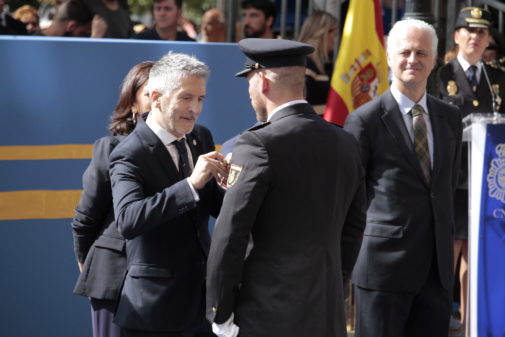- Interior: The Civil Guard stops nine independentistas accused of planning attacks with explosives
- Catalonia: The link between Quim Torra and the CDR: the "targeted" family in the radical group
- Security.Interior reinforces with 750 riot police Catalonia for the 1-O and the sentence of the process
The operation carried out on Monday by the Civil Guard against the so-called Defense Committees of the Republic (CDR) in Catalonia has caused discomfort in the Government, which has asked the Armed Institute for accounts of the extent of the arrests and the material seized. The Interior Minister himself, Fernando Grande-Marlaska, summoned the Civil Guard commanders to reprimand them because he considers that they had not informed him in advance of the importance of what was going to happen, according to sources in this department.
The malaise expressed by Marlaska came from Moncloa. When on Monday the acting president of the Government, Pedro Sánchez, set foot in New York and talked a few minutes with the journalists who were waiting for him, he did not know that explosives had appeared in the operation that was currently being carried out by the Civil Guard. He didn't know how to value it.
When asked about the operation in Catalonia, Pedro Sánchez was caught with his foot changed. I knew there was going to be a Civil Guard performance and that it was important, but I didn't know that there was a possibility that an important group of radicals could be found explosives. Nor that, as pointed out by the Prosecutor's Office, the CoRs intended to carry out violent actions on the day the sentence of the prosecution is known.
This circumstance has caused an important malaise in La Moncloa, which interprets that the fact that in Catalonia there are radicals with explosives is a qualitative leap in what have been so far the actions of the CDR. He understands that the acting president should be warned before getting off the plane. In the records, the researchers located a map of a Civil Guard barracks in Catalonia, which is presumed to be one of the objectives of the detainees.
From Moncloa they asked the Interior Ministry, led by Grande-Marlaska, for accounts. According to sources from this department, the minister had been informed on September 20 that he was going to perform, under the baton of the National Court, an operation classified as "very important" by the operatives in Catalonia.
Low public relevance
That was, according to these Interior sources, the information transmitted to the president. They admit that at that time he was not informed of the possibility of explosives appearing, but they explain that this data only reached the department later, when the searches and seizures began to be carried out.
A striking part of the arrests was the low public relevance that was granted to the so-called Judas operation both from La Moncloa and from the Interior, where information was not even provided on a public note, as is usually done when it comes to relevant operations and after agreeing the data provided with the judicial authority.
Moncloa complained to the Interior about not knowing more precise data about the possibility of locating explosives and the department led by Grande-Marlaska transferred this complaint to the Interior and Civil Guard operatives, the body responsible for detentions and searches.
Those responsible for the operation argued that they had correctly transmitted the importance of the operation that September 20, three days before it occurred, and that at that time the location of explosives could not be ventured.
The minister then decided to hold the meeting with those responsible for the operation; with the general director of the Civil Guard, Félix Azón , and with the Secretary of State for Security, Ana Botella . Marlaska demanded much more complete information, at least in terms of relevance, when an operation of this draft was to take place.
Research sources recall that the operation that began in which nine members of the CDRs were arrested is not yet completed. In fact, as a result of the documentation analysis, no new arrests are ruled out.
This Thursday, seven of the detainees are expected to go to court once the head of the Central Court of Instruction number 6 of the National Court, Manuel García Castellón , returns from a rogatory commission abroad.
According to the criteria of The Trust Project
Know more- Civil Guard
- CDR
- Catalonia
- National audience
- Pedro Sanchez
- Fernando Grande-Marlaska
- Terrorism
- 1-O trial
CourtsTwo detainees linked to the CDRs recognize the purchase of explosive substances to "make noise" for 1-O
CourtsThe CDR ended a terrorist attack in Catalonia "on D-Day"
Catalonia Independence joins to discredit the operation against the CDR

